Sherlock‘s third episode of the fourth series, “The Final Problem,” was like watching only Theon’s “arc” from the third season of Game of Thrones. Just torture porn, nothing else. It gives me little pleasure to delve into it, but I suppose the sooner I start, the sooner it’ll be over…
Recap
We start with a little girl on a plane full of sleeping people. The pilot is asleep, too, and the plane is about to crash. She hears a phone ringing, and answers it.
Next we see Mycroft being plagued by shadows and voice of his sister—plus a creepy clown. It turns out this all was orchestrated by Sherlock to verify he really did have a sister. He doesn’t remember her, but John told him about his experience at the “therapist.” As it turns out, she only shot him with a sedative at the end of “The Lying Detective”. John advised Sherlock that the only way to get Mycroft to speak the truth was to get him mad with fear, because he’s oh-so-ethical, and Sherlock went along with it.
Some exercise in humiliating Mycroft follows, at the end of which we hear the story. Eurus was (what astonishment) even smarter than Mycroft, but, a double twist, she was evil. She killed Sherlock’s dog and burned down their house (isn’t that what people say they’d do in a joke?), after which she was catered off to a mental health institution. Some time later, Mycroft told his parents that she was dead. He believed it was kinder than the truth, which is that he had her locked down in an extra-secure prison/psychiatric hospital. He describes it as hell, because apparently keeping someone securely locked up is synonymous with the place being terrible, because reasons.
Then a drone comes to 221B and explodes, the three men all barely saving their lives.
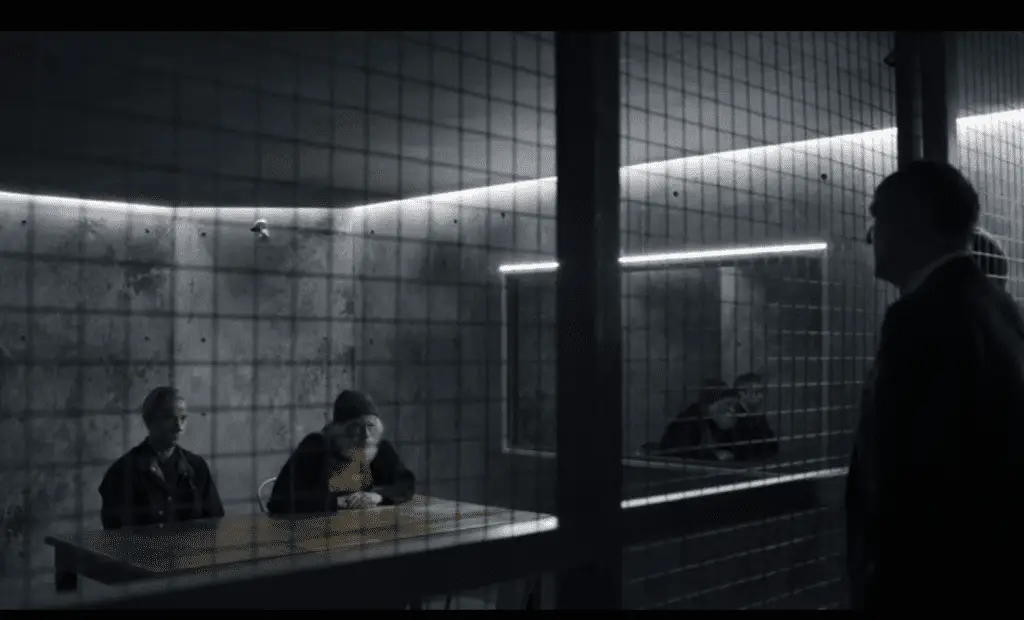 Using a disguise because they don’t know whom to trust, the Holmes brothers plus John infiltrate the prison/hospital. While John and Mycroft chat with the director, Sherlock goes to see Eurus. This is where it starts getting really stupid.
Using a disguise because they don’t know whom to trust, the Holmes brothers plus John infiltrate the prison/hospital. While John and Mycroft chat with the director, Sherlock goes to see Eurus. This is where it starts getting really stupid.
Mycroft states, plainly, that everyone who went down to speak with Eurus was converted to her side, became her slave in a way. The director adds that she once got a psychiatrist to kill his entire family and then himself. See, apart from being the smartest, Eurus also has Dominate Person with a really hard Will save. But in spite of that, Mycroft decided that the best thing to do was send Sherlock to talk to her, alone.
The only reason she doesn’t Dominate him, apparently, is that she has different plans for him. It’s revealed that the glass cage that’s supposed to be holding her actually has no glass. Sherlock, who will notice and identify different kinds of cigarette ash, has not noticed this. I mean, what is refraction of light? Or the sound of the violin she’s playing, which would carry very differently from behind a glass? But Sherlock is suffering from temporary idiocy, so he notices none of that, and allows her to get a drop on him.
Oh and by the way, the glass was removed by the director, who is also being controlled by Eurus, because he spoke to her. Dominate Person is a bitch.
Sherlock wakes up in a cell with Mycroft, John and the director. Eurus is in charge, and there are video messages of Moriarty included because…I don’t even know. He’s popular with the viewers, I guess? I mean, she said something about it being his revenge, but I don’t see how he added anything to the story.
Eurus puts them on the phone with the girl on the airplane we saw at the start. The girl asks them to save her. Eurus cuts the call off shortly afterwards, clarifying that to get phone time with the girl, they must complete the tasks she sets them. The first is that Sherlock chooses whether John or Mycroft should kill the director, and one of them has to do it. If they don’t, Eurus will kill the director’s wife. Mycroft refuses to do it, stating that he will not “have blood on his hands”. John agrees to, but then finds he can’t. The director shoots himself, but that doesn’t fulfill the rules, so, predictably, Eurus then shoots the wife as well.
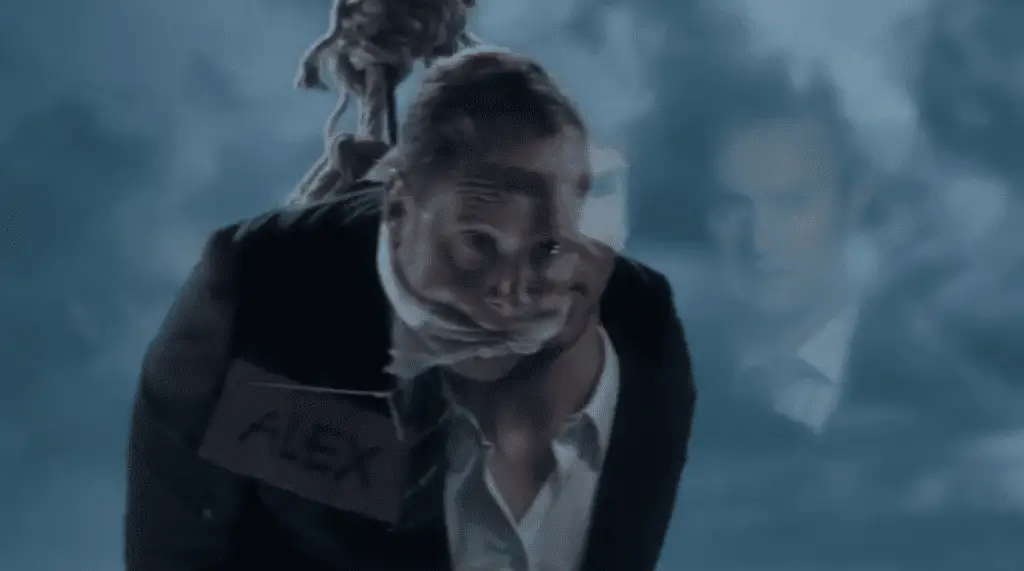 There’s another puzzle with three suspects of murder who hang suspended over the sea. Sherlock is supposed to say who is the culprit and condemn him—the implication is that he will be dropped. Sherlock solves the case, but in a shocking twist, Eurus drops the other two. Then she drops the third one, too, for a good measure.
There’s another puzzle with three suspects of murder who hang suspended over the sea. Sherlock is supposed to say who is the culprit and condemn him—the implication is that he will be dropped. Sherlock solves the case, but in a shocking twist, Eurus drops the other two. Then she drops the third one, too, for a good measure.
The next room has a coffin and Sherlock is meant to deduce who it is for. It’s Molly, and Eurus tells him there are explosives in her flat. Sherlock has three minutes to get her to tell him she loves him without telling her what is going on, otherwise the explosives would go off. He does his best, and Molly sets as a condition that Sherlock has to say it first. He does, and she says it back, admitting it’s true. Eurus then tells him there were never any explosives.
Following this, Sherlock has an emotional breakdown and breaks the coffin. John tells him they have to be like soldiers, put their feelings away and march on. All of these scenes are also intercut with talks on the phone with the girl and videos of Moriarty.
Next room is the one where, as foreshadowed, Sherlock is supposed to choose whether he’d shoot Mycroft or John. Mycroft tries to goad him into shooting him by acting like a jerk, but Sherlock doesn’t fall for it, showing more knowledge of his brother than he had to date, and instead decides to kill himself after a time. Eurus panics and shoots all three of them with a sedative once again, right in the necks from the walls, because apart from Dominate Person, she apparently has True Strike as well. Impressive spellbook, lady!
Sherlock wakes up in what at first looks like another cell, but it turns out it’s just a paper room in front of his old house. He’s alternately on the phone with John, who’s in a well and slowly being drowned, and with the girl on the plane. John finds Redbeard’s bones in the well, and as Sherlock frantically tries to save him he remembers, with Eurus’s help, that Redbeard wasn’t a dog, it was the pirate name of his friend Victor Trevor whom Eurus drowned.
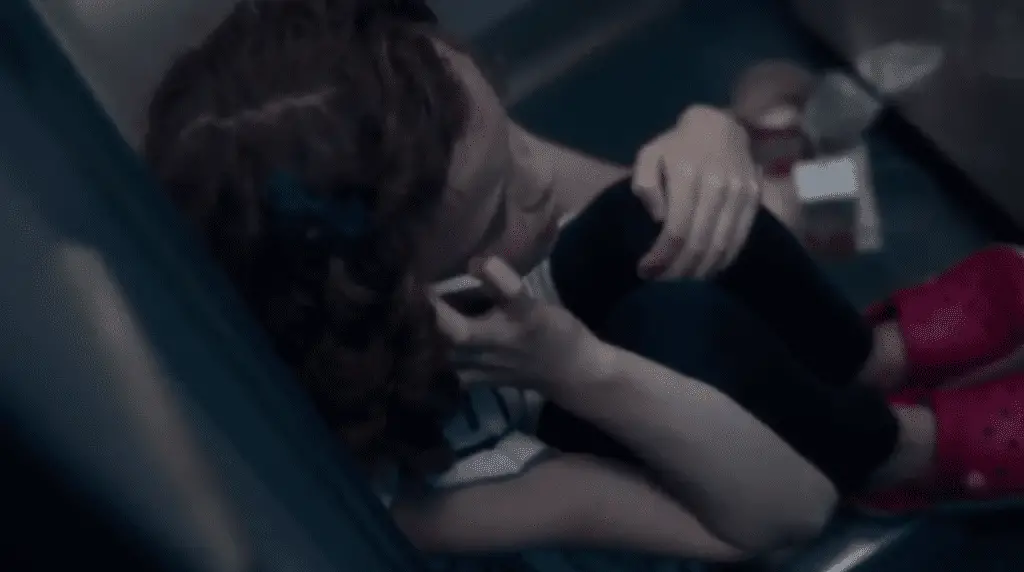 It also transpires that the girl on the plane is actually a representation of Eurus’ self, who’s just a lost little girl. Sherlock tells her he will be her friend or some such, and she helps him save John. She’s then shipped off to the same prison again, but this time Mycroft tells his parents about it. They’re extremely angry with him and turn to Sherlock for help. He goes to play violin with Eurus, and their parents come there to listen.
It also transpires that the girl on the plane is actually a representation of Eurus’ self, who’s just a lost little girl. Sherlock tells her he will be her friend or some such, and she helps him save John. She’s then shipped off to the same prison again, but this time Mycroft tells his parents about it. They’re extremely angry with him and turn to Sherlock for help. He goes to play violin with Eurus, and their parents come there to listen.
John and Sherlock rebuild 221B and continue their detective work (with references to canonical cases) as they listen to a message from Mary about how that is what they should do.
The end.
Review
So, you probably gathered from the recap that I do not believe the episode was very good.
It did have emotional strength, I will grant them that. I just happen to think that emotional torture for the sake of emotional torture is not a particularly great piece of writing.
And unfortunately, that is what happened here.
Let’s take a closer look. It was not plot-driven, to be sure. There was no very intriguing detective case to carry it. All of its focus, in fact, was on characters. Sherlock is the protagonist, so this entire story was probably supposed to change or affect him somehow, to do something to his character development.
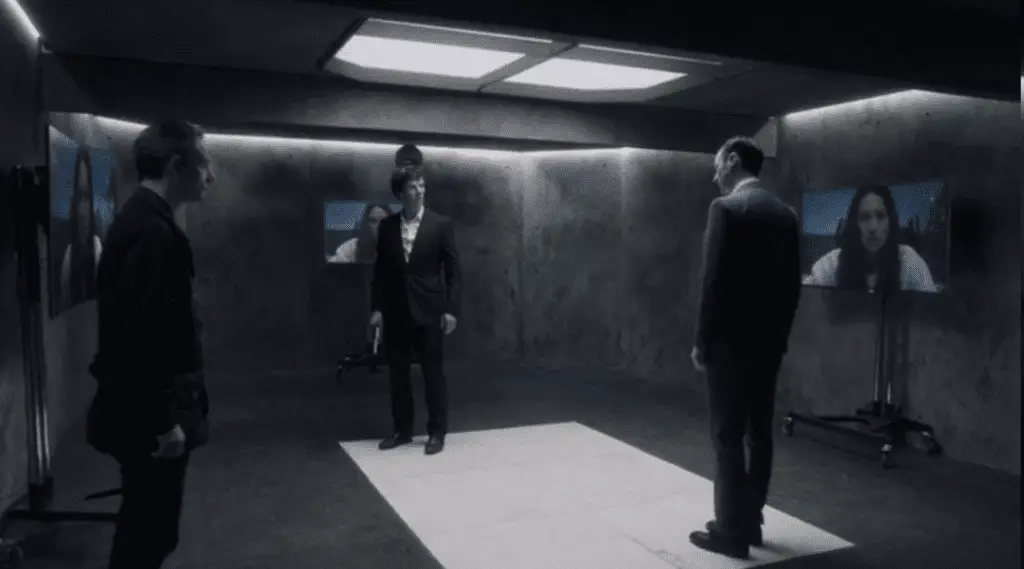 It was a prime opportunity to explore Sherlock’s relationship with Mycroft and move it in some new direction. That didn’t happen, or at least not properly. As I said, Sherlock showed more awareness of his brother’s personality than ever before in the scene when Mycroft tried to goad him. But there was no realization. It could have been a brilliant moment, Sherlock realising that Mycroft was trying to goad him. Realising what it meant about him, about their relationship. Realising how he had misjudged his brother for all those years.
It was a prime opportunity to explore Sherlock’s relationship with Mycroft and move it in some new direction. That didn’t happen, or at least not properly. As I said, Sherlock showed more awareness of his brother’s personality than ever before in the scene when Mycroft tried to goad him. But there was no realization. It could have been a brilliant moment, Sherlock realising that Mycroft was trying to goad him. Realising what it meant about him, about their relationship. Realising how he had misjudged his brother for all those years.
It wasn’t.
There was a hint of a development of this sort, however, when at the end Sherlock indicates to Lestrade that he worries about Mycroft. (Nice wink to Mystrade, by the way). Good. That is progress. But what was it based on? Was it because of the goading attempt? If so, it wasn’t explored properly in that scene. Was it a result of Mycroft’s general discomposure during the whole ordeal? I suppose that’s possible, but well, more on why that’s not satisfactory later. It is a point, of sorts, at least—Sherlock realizes that his brother is human, too. Nice.
Is it enough to justify ninety minutes of emotional torture? Hardly.
So was there anything more? Was the point, perhaps, more generally Sherlock learning compassion? If this had happened in season 1, it could have been. But at this point Sherlock spent the past episode showing nothing but his compassion, be it to John or to ‘Faith.’ He doesn’t need to learn that anymore.
I do have a sneaking suspicion that was meant to be the point, however. Lestrade says at the end that Sherlock is not only a great man, but a good one, a reference to his line in the first season. But once again, Sherlock has been acting selflessly for two and half seasons now. And at the end, we see him returning to life exactly as he lived it before. This is hardly news. I want more.
If Sherlock had known about Eurus, “The Final Problem” could have been a dramatic story of him learning to understand her. But as it was? He didn’t have a sister, and now he does. So what?
Or was it Eurus’s story? But what was her storyline, except for being “crazy”? Was it all about her learning compassion? Except she had none until she did for a moment there. That was no story.
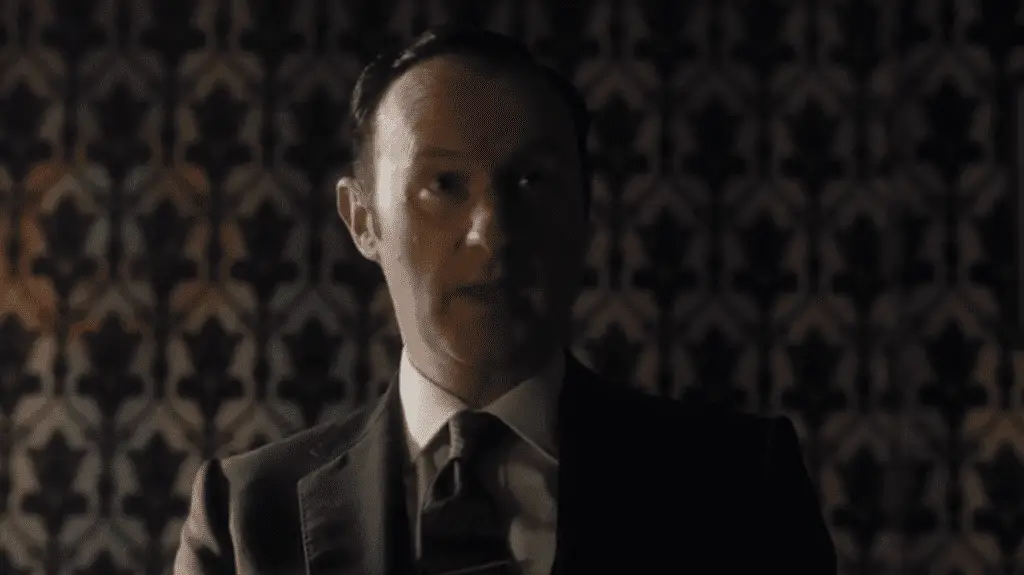
In fact, this episode might work best if we look at it as Mycroft’s story. He seemed to learn something by the end—that he’s not always right—and acted accordingly. Even that point is made rather strangely in some ways, like Mrs. Holmes stating Sherlock was “always the grown-up one” (footage not found), but fine. I accept it’s there. This would work nicely…if it wasn’t for the fact that Mycroft is desperately out of character the entirety of “The Final Problem”, with a single exception.
I’ve been complaining about his genius being in absence for the last two episodes, but this takes the cake. His character traits, too, went the way of the genius. Mycroft would not balk at the idea of killing the director, nor would he waste time wailing how terrible and insane Eurus’s tasks were. There are ways to decompose him, mostly related to Sherlock. This isn’t one of them, and this isn’t what it looks like. We saw him decomposed in “A Scandal in Belgravia”, and then again in “His Last Vow”. Those were brilliant Mycroft character moments, short as they were. This episode wasn’t.
And his sensitiveness that came out of nowhere? We saw Mycroft infiltrate his way into a violent gang. He was able to watch Sherlock get beaten bloody without moving a muscle. He’s the puppet master behind the British government. And now he refuses, on principle, to shoot a man who wants to be shot? Really? Who are you and what have you done with Mr. Holmes?
A smart, emotionally cold character was turned into an emotional idiot. Bravo.
The one exception in his portrayal I referred to is a truly brilliant character moment for Mycroft. In fact, it is nearly the only interesting character moment in the story. It’s Mycroft’s attempt to goad Sherlock into shooting him. It was solved too quickly, waved aside for less interesting things, and it did not have room to breathe. But it was, for me, Mycroft in a nutshell. Ever since he first heard Eurus indicate Sherlock would have to make this choice, I imagine, he had been thinking about what to do. And when the task is presented, he doesn’t hesitate and tries to goad Sherlock straight off, to give him no time to think, using what he knows Sherlock believes about him to reach his goal.
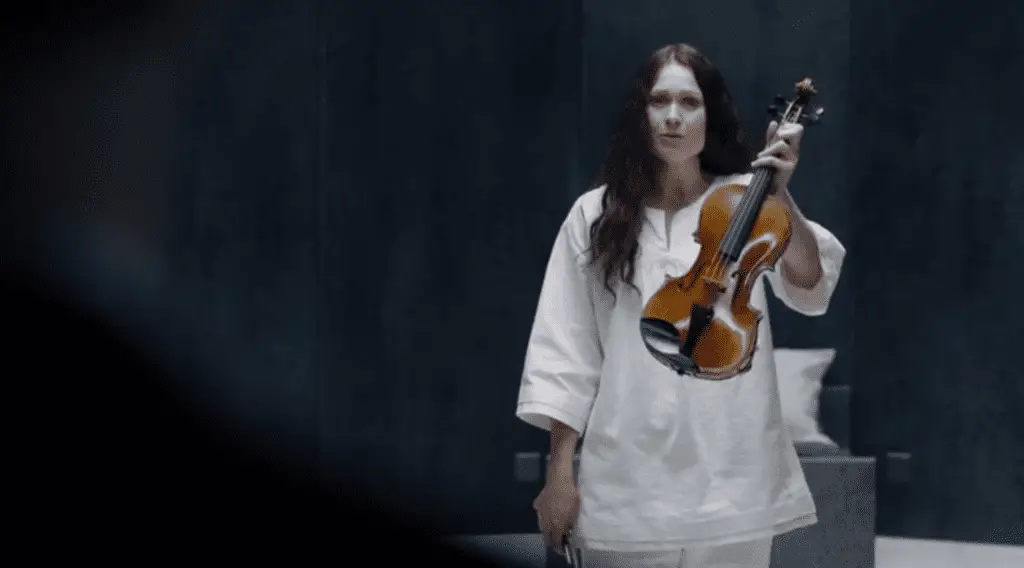 The twist, of course, is that he is right in his initial statement and, pragmatically speaking, his survival would give them the better chance of saving the plane. But at this point, Mycroft is not giving priority to that. He’s chiefly thinking about sparing his brother the pain of having to make this choice, and of having to shoot his best friend. Whatever happens would be brutal, but he’s chosen the way of least pain for his brother. That, to me, is Mycroft in a nutshell. Where was he for the rest of “The Final Problem”, though?
The twist, of course, is that he is right in his initial statement and, pragmatically speaking, his survival would give them the better chance of saving the plane. But at this point, Mycroft is not giving priority to that. He’s chiefly thinking about sparing his brother the pain of having to make this choice, and of having to shoot his best friend. Whatever happens would be brutal, but he’s chosen the way of least pain for his brother. That, to me, is Mycroft in a nutshell. Where was he for the rest of “The Final Problem”, though?
Or was it supposed to be a revelation to all present, that he’s not as hard-hearted as he pretends to be? But it was not a theme, no one reacted to it, nothing was done with it at all. And frankly, it wasn’t even consistent. He also suggested they’d help the girl navigate the plane above water and then crash to save a city with complete, cold pragmatism in a different scene. So what is this?
And why does Mycroft even go to Sherlock about Eurus in the first place? Why does he take him there when he knows how dangerous it is? He learned that Eurus was out of the prison. Fine. Why didn’t he go deal with it himself, if he’s so well equipped for it? Questions, so many questions…
As for Sherlock’s character moments, he had plenty of them, and most were strong and powerful. If I want to nitpick, I’ll say that while I did feel his despair about getting Molly to tell him she loved him, his rage afterwards didn’t quite work for me. I understand it was hard for Molly, but…come on. Here are worse things. This sort of reaction to the dilemma Eurus forced him into next would have been much more natural. But in the overwhelmingly successful writing of his emotional reactions, i’m willing to forgive that.
John’s moments were well done too, both the one when he couldn’t shoot the director and the one when he faced death by Sherlock, accepting it, as well as the soldier moments.
Eurus, on the other hand…don’t even get me started on Eurus.
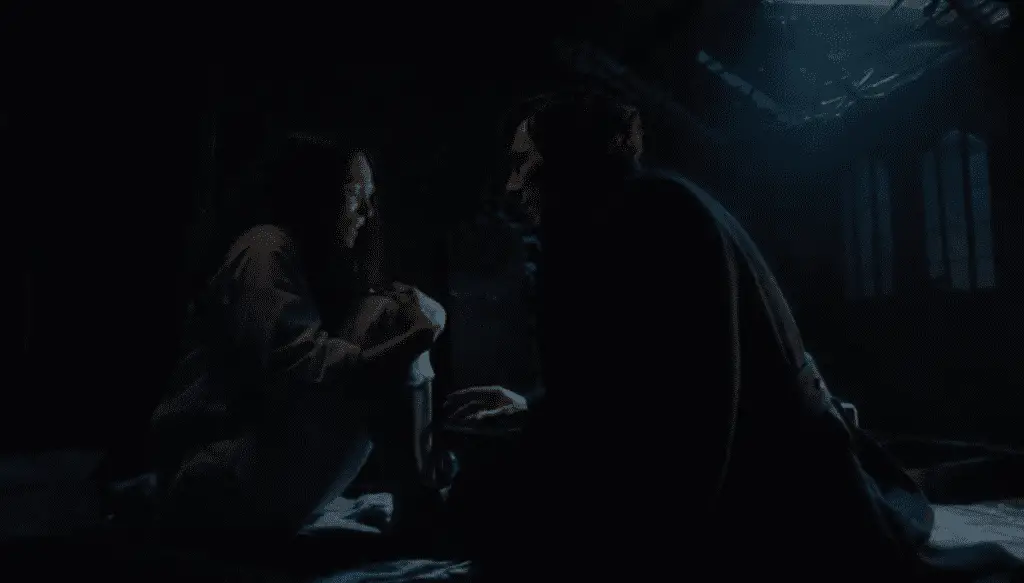 I complained about the show’s heteronormativity in the last review, and its tendency to exclude any neuroatypicality goes hand in hand with this. It sounds paradoxical from a show the hero of which proudly pronounces himself to be a high functioning sociopath, but it starts there.
I complained about the show’s heteronormativity in the last review, and its tendency to exclude any neuroatypicality goes hand in hand with this. It sounds paradoxical from a show the hero of which proudly pronounces himself to be a high functioning sociopath, but it starts there.
Sherlock has never really been consistently depicted as a sociopath. He just casually waves the label because it sounds cool. And no one ever corrects him. On the other hand, there are villains who are heavily implied to have “insanity” as their sole guiding motivation, because somehow that is supposed to be enough. As if all people with antisocial personality disorder went around killing others. Apparently, in the minds of the show writers, that’s what they do.
This bias in favour of neurotypicality shows on smaller scale in Mycroft and Sherlock, too. Sherlock was seen as morally evolving when he started to show emotions closer to the neurotypical way of doing so. And Mycroft, who held out a little longer, only gets some regard when he displays emotional vulnerability. The unvoiced implication is that if you don’t display emotions like “normal people,” you don’t deserve any decency.
And last but not least, I cannot not mention again Eurus’ ridiculous abilities which really amounted to magic. When the taxi driver in “A Study in Pink” said that he speaks to people and they kill themselves, it was an intentionally distorted version of the truth. Three seasons later, and Eurus can literally do it, because the writers have apparently stopped caring.
Sherlock has been criticized for a long time for not having enough strong woman characters. To its abysmal balance, it now adds a Villain Sue-ish carricature of an “insane killer” who, in the end, has to be saved by her brother anyway. What more is there to be said?
I had such a nice headcanon about Sherrinford, too. To think it’s been made AU because of this…

